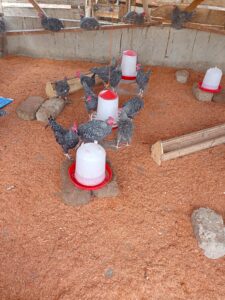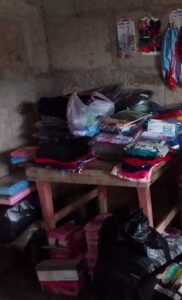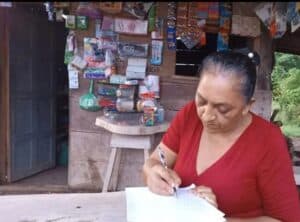El Limon Takes Action to Acquire Good Quality Water
By Orlando Jose Montiel, Clean Water Program Officer, Self-Help International Nicaragua

El Limón is a rural community located approximately 45 kilometers northeast of the city of Nueva Guinea in south central Nicaragua. It has a population of 450 people living in 90 houses distributed along two main streets leading to the old road to Bluefields.
For many years, El Limón had a shallow open stream for a water source, in poor condition, which required people to carry water long distances to meet the needs of their homes. Things began to change in May 2023, thanks to collaboration between the Mayor’s Office of Nueva Guinea and residents of El Limón. The Mayor’s office donated materials for the construction of a gravity water supply system which would carry water by pipes to each of the houses in the community, including PVC pipes and accessories, a plastic tank to store water and more. The Mayor’s Office technician, David Ortega, asked the community for all possible support to bring the project to fruition. Community members organized and worked hard, digging trenches from the water source to the homes of each family, burying the PVC pipes, and installing the water system and plastic tank, doing all this in record time.
Having completed the entire construction process of the water distribution system, the next issue that the water management committee (CAPS) of El Limón had to resolve was how to purify the water. Drinking untreated water led to many health problems such as diarrhea and fever, so the CAPS began to seek ways to purify the water now that they had pipe-born water to their homes. One of the doctors at the community health center proposed doing a study of the quality of the water that the residents consumed. He sent a sample of the water to a laboratory in Bluefields, which confirmed that the drinking water was contaminated.

Once everyone was sure of the next step to follow, the CAPS contacted the technician from the Mayor’s Office to ask if he knew anyone who could help them purify the water. He told them that the Clean Water Program promoted by Self-Help International (SHI) covered the region of New Guinea and was responsible for this type of work. SHI could provide water treatment and other benefits that they could receive for free. The CAPs members told the technician that they wanted to partner with SHI to improve the quality of the water in their community.
The technician from the Mayor’s Office contacted Orlando Montiel, SHI’s Clean Water Program Officer, to ask for training on water quality and the use of manual chlorinators with chlorine tablets. This resulted in an alliance to help rural communities in Nueva Guinea improve the quality of the water they consumed.
Orlando traveled to the area to offer informational and practical training sessions, and was particularly impressed by the participation of the El Limón CAPS members. This community showed interest in everything related to the topic of water. The directors of the CAPS were eager to acquire a chlorinator to make the water drinkable, because according to their own words, “If this contaminated water is not chlorinated, it can make the people who drink it sick.”
By October 2023, the chlorinator was installed inside the water distribution tank. This tank is located in the high part of the town, so that the water is delivered by gravity through PVC connections to each home. The SHI Clean Water Program also provides training in the use and maintenance of the chlorinator as well as in monitoring the chlorine tablets, thus providing better service to the population. Currently the community is purifying 20,000 liters of water per day, which is available to the entire population.
The community is aware of the importance of using the chlorine tablets to purify the water and make it safe for health. Initially it took some time for community members to adjust to the taste of the chlorinated water, but they continued the process because they understood the importance of chlorination, arguing that it was just a matter of getting used to it. Now they feel secure because in addition to not having to carry water long distances, they also have safe water to drink and are avoiding many water-borne diseases





